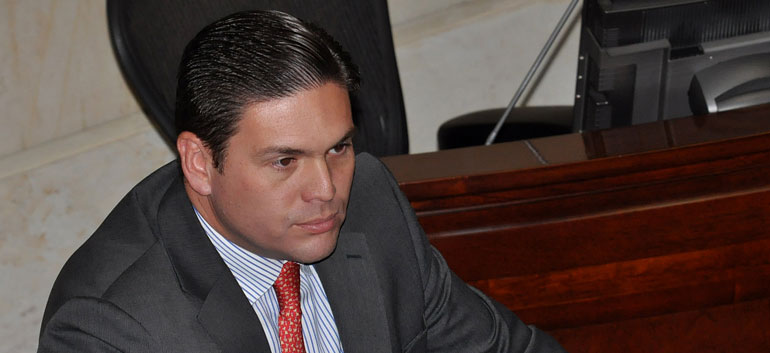Recent revelations regarding the illegal wiretapping of politicians, journalists, and peace talks negotiators could become a “Criollo Watergate,” opposition presidential candidate Clara Lopez said Wednesday, after Colombia’s Minister of Defense failed to respond to Congress.
Lopez, the presidential hopeful representing Colombia’s main socialist party, the Democratic Pole (Polo Democratico Alternativo – PDA), claimed in a radio debate that she and her fellow party members had become victims of “political espionage,” referring to a secret Army surveillance program that targeted opposition politicians, among others.
MORE: Colombian Military And CIA Accused Of Spying On Peace Talks
Hundreds of messages intercepted
Liberal Party leader Simon Gavira echoed Lopez’s indignation, claiming that the military illegally intercepted hundreds of electronic messages sent between Liberal Party members via Blackberry or the Whatsapp messaging service.
Roughly one hundred of these wiretaps were carried out without the necessary legal support, said the Liberal Party leader, who pointed out that it is still not clear whether the gathered intelligence went to the government or people with outside interests and contacts within the state apparatus, a possibility that has been floated by Colombian President Juan Manuel Santos.
Speculation has risen that former President Alvaro Uribe Velez may be included in the “dark outside forces” President Santos has referred to. Uribe, himself a subject of ongoing congressional investigations into a previous illegal wiretapping scandal that exploded during his presidency, maintains close ties to various factions of the Colombian military, and has been a staunch opponent of the Colombian peace process.
Defense Minister responds before Congress
Defense Minister Juan Carlos Pinzon, who had been called to appear before Congress on Wednesday, asked lawmakers attending the closed session to “wait for the results of the ongoing disciplinary, administrative and criminal investigations” without presuming guilt, according to his website.
| According to Newspaper El Espectador, the minister had denied communication had been intercepted, but admitted that the military had used “electromagnetic spectrum monitoring.” This is an intelligence method reportedly approved in the 2012 Intelligence Law that became controversial as officials failed to explain what “electromagnetic spectrum monitoring” means. |
Pinzon said the administration of President Juan Manuel Santos is “committed and willing” to clarify the questions over who ordered the reported wiretapping and assure that “those responsible, if there are, will be punished.”
The minister was accompanied by Armed Forces commander General Leonardo Barrero, Army commander General Juan Pablo Rodriguez, National Intelligence chief Alvaro Echandia. Prosecutor General Eduardo Montealegre, who was also cited, failed to appear.
Conservative Party Senator Carlos Emiro Barriga was quoted by Caracol Radio as saying that “everything was clear” and that there had been no illegal activity by the military.
Other coalition senators, however, together with members of the opposition, claimed that only a fraction of the Intelligence Committee’s questions were even answered by military officials called to give testimony.
“Only five of the 64 questions we had formulated were answered,” said PDA Senator Camilo Romero, adding that “the media has more information than the government.”
Senator Juan Carlos Lozano (U Party) was among those left unsatisfied with the government’s response, and the committee ultimately called for a second session on the subject.
The scandal’s expanding reach
The Semana magazine was the first to break the story last week, after a 15-month investigation into the Army’s covert surveillance program. According to Semana’s report, a secret military intelligence unit had been intercepting emails and text messages of left-wing politicians and government and rebel delegates to ongoing peace talks between the Colombian state and the FARC rebel group, the country’s oldest, being held in Havana, Cuba. The surveillance program was reportedly just one month before the start of peace talks in November of 2012.
The United States-based Univision media outlet later reported that the communications of dozens of journalists covering the Colombian peace process, including those from news agencies like Associated Press, Reuters and EFE, had also been intercepted by the military intelligence unit.
Following the publication of the allegations, Santos dismissed the commander of Military Intelligence and three other top military officials. Further action is still expected, pending the results of ongoing investigations within the Ministry of Defense.
The wiretap scandal is the second to hit Colombia in the past five years. In 2009, Santos — as Defense Minister in the administration of former President Alvaro Uribe — became embroiled in a similar scandal involving the illegal wiretapping of politicians, Supreme Court justices, journalists and human rights workers. The scandal forced the former spy chief to flee the country, while other top officials, including Uribe, became the subjects of ongoing investigations.
The previous wiretapping scandal implicated high-level members of the intelligence community. So far, none of the media reports on the most recent surveillance program have clarified whether the “Andromeda” unit responsible for the spying acted alone or under directions from superior officers.
Sources
- Inteligencia Militar ha servido para dar golpes más contundentes al terrorismo: Mindefensa (Defense Ministry)
- Congreso solo recibió cinco respuestas en caso de ‘hackeo’ militar (El Tiempo)
- Ampliación de permiso para interceptaciones (Noticias Uno)
- Un pálido debate a ‘chuzadas’ (El Espectador)




